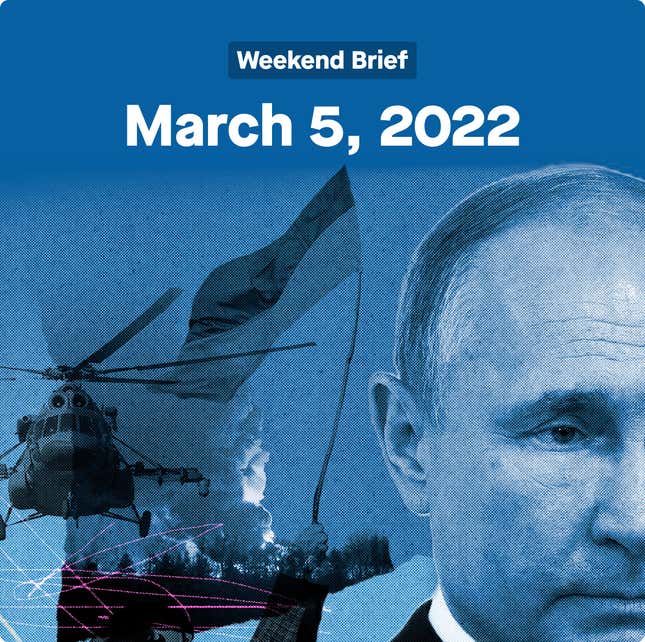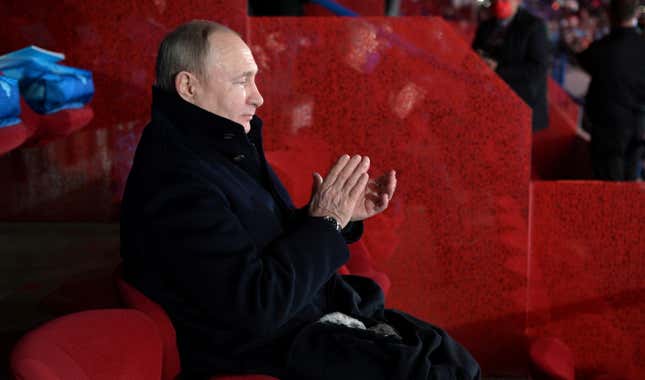
Hi Quartz members,
For as long as people have written about war, they’ve argued over how to explain it. Is war caused by the desires, obsessions, and failings of the people in charge? Or is it the result of circumstances and incentives? Zoom in? Or zoom out?
Just two weeks ago, the trade-offs for Russia of a full-on Ukraine invasion made its likelihood seem low. So why did Putin invade? New York Times columnist Tom Friedman took the zoomed-in view to an extreme, writing that “The only place to be for understanding this war is inside Russian president Vladimir Putin’s head.” A more nuanced version comes from Brookings fellow Fiona Hill, who in her biography Mr. Putin describes a key aspect of her subject’s identity as his “firm conviction that his personal destiny is intertwined with that of the Russian state and its past.”
In other words: To understand the war, understand the person waging it.
But “political scientists are trained not to think about leaders,” says Gautam Mukunda, a political scientist at Harvard Business School whose research does focus on leadership. Instead, many of them prefer the logic of power and incentives. For example, “the idea of Ukraine in NATO is something that every Russian leader of any political stripe would find to be unacceptable,” says Mukunda. “That’s not unique to Putin.”
And if Putin misjudged the resolve of both Ukraine and NATO, that’s not unusual either, according to Chris Blattman, an economist at the University of Chicago and author of the forthcoming book Why We Fight. One of the most common reasons adversaries go to war, he argues, is because they can’t adequately judge each others’ strength, and each side is overconfident. Fighting reveals valuable information. Until last week, for example, it wasn’t clear how far Germany would go in supporting sanctions. “This is how you find out,” Blattman told Quartz. “You invade. Most wars, when they happen, are short. Because all this stuff gets revealed.”
In the case of Russia, it’s even harder than usual to separate the leader from the circumstances: After more than 20 years of Putin rule, they are two sides of the same coin. “Power changes who people are,” says Mukunda. “It makes them more aggressive, more Machiavellian, more manipulative. For most people, it makes them worse.”
5 theories of war
In Why We Fight, Blattman uses game theory to explain why war does and doesn’t happen. His starting point is that war is rare because it’s expensive. But five factors can overwhelm the incentives for peace:
💪 Unchecked interests. War is more likely when the people in charge don’t pay the price for it. That’s almost always true to an extent, but some leaders are more or less insulated from the costs of conflict.
🎲 Uncertainty. Neither side knows for sure how strong the other is. One side could be bluffing about its strength or resolve, so sometimes the other side calls.
🗝️ Commitment problems. When one side is growing stronger, the other may want to attack before its adversary gets too powerful. The growing power might promise not to attack later on when it’s the dominant power, but that commitment can’t be trusted.
🤔 Misperceptions. Decision makers are overconfident and don’t understand how their adversaries think.
🖤 Intangible incentives. Sometimes people care about things that can’t be bargained for and go beyond costs and benefits—like vengeance, glory, or freedom.
3 theories of Putin

In their book Mr. Putin, Fiona Hill and her Brookings colleague Clifford Gaddy mine Putin’s biography and sketch three core “identities” that define his approach to power.
- The statist. Putin came to power when “many internal observers feared Russia was in danger of total collapse.” He pledged to restore order by restoring the power of the state.
- The “history man.” An avid reader of history, he sees himself as connected to Russia’s long imperial past—and shapes how Russian history is presented to suit his purposes.
- The survivalist. Through his own experiences and those of his country, Putin absorbed the importance of flexibility and preparation for worst-case scenarios. Among other things, it drives his commitment to building large reserves of foreign currency.
Why Putin invaded
Melinda Haring, deputy director of the Atlantic Council’s Eurasia Center, was not surprised when Russia invaded Ukraine. In November, she warned that “Putin will strike Ukraine again, and soon.” Here’s why she thinks Putin took the risk:
- He felt insulated from sanctions because he’d built up a large reserve of foreign currency. Historic sanctions that prevent some of that reserve from being used will test his theory.
- He misunderstood Ukraine. Putin underestimated how much Ukrainians value independence and expected minimal resistance.
- He perceived Western weakness. “Putin may not feel invincible,” Haring wrote in November, “but when he looks at a leaderless Europe and the domestic chaos in the United States, he’s confident that he has a free hand in eastern Europe.”
- He was tired of dealing with Zelenskyy. The young president was inexperienced and Ukraine was the weaker nation; Putin “was frustrated that he couldn’t get a deal.”
- He believed time was against him. “Ukraine is changing,” Haring told Quartz, “and if he doesn’t intervene now, Ukraine will no longer be in his sphere of influence.”
- He wants his legacy to include territorial expansion. “Greatness in Russian history is measured by territorial conquests, not GDP,” Haring writes.
What to watch for next
- “It’s all about Kyiv,” says Haring. A 40-mile convoy of Russian tanks headed for Ukraine’s capital had made “little discernible progress” as of Thursday, according to UK officials. But that could change, and experts caution against underestimating Russia’s military based on the past week.
- More sanctions could be coming. Two areas to watch: The US and EU could expand “secondary sanctions” against countries doing business with Russia. Or they could include energy, the most important exemption to date. That would require Europe to quickly find alternatives to Russian gas.
- What’s the off-ramp? There are multiple justifications for sanctions, as political scientist Dan Drezner notes, but “If the goal is to compel [Russia to change its behavior], then the sanctioners need to be explicit about what Russia can do to get the sanctions lifted.” Noah Smith writes that “EU leaders and Biden need to announce clearly and repeatedly that if Russian troops pull back from Ukraine, the sanctions will all be quickly dropped.” Would that be enough? Or would the West demand reparations?
- Monday’s Forecast email. We’ll dive into the current financial warfare, and where it goes next.
Quartz stories to spark conversation
🔥 The world is getting climate change adaptation wrong
🔧 How sanctions are squeezing the Russian middle class
⏲️ There’s a job perk more popular than four-day workweeks
🇺🇦 A cheap drone is giving Ukraine’s military an edge
👶 Can “parenting” go on your resume? LinkedIn says yes
🛢️ How Europe could quickly cut its Russian gas use by a third
🤞 Large employers are women’s best hope for fertility benefits
5 great stories from elsewhere
🧠 How do you solve a problem like the internet? Web3 is often touted as the more open, more free, and less centralized internet of the future. But it’s still selling a “promise we were sold a decade or so ago,” Colin Horgan writes in OneZero, “that the more we’re connected, the more trust would be created.” And who still believes that?
💬 A chat with Mohammed bin Salman. In an interview with The Atlantic, the crown price of Saudi Arabia defends holding Saudi officials hostage in the Ritz-Carlton and says Washington Post columnist Jamal Khashoggi—whose 2018 murder MBS is accused of ordering—”would not even be among the top 1,000 people” on his hit list.
🍦 McDonald’s hard line on soft-serve. One in seven US McDonald’s ice cream machines is out of commission… so why is the fast food giant telling franchisees to ditch Kytch, whose devices help fix them? “They’ve tarnished our name,” Kytch co-founder Melissa Nelson tells Wired; she’s suing for $900 million.
👿 New life for “zombie urchins.” Purple sea urchins are known for devouring kelp forests, and a series of environmental phenomena have them proliferating in California. But what if a pest could become a delicacy? The Los Angeles Times look at how urchins fattened up to produce fresh roe for restaurants are giving the species new purpose.
💔 Does my son know you? “I don’t want Jackson to have the same childhood that I did,” Jonathan Tjarks writes in a beautiful post for The Ringer about his terminal cancer diagnosis. “I want him to wonder why his dad’s friends always come over and shoot hoops with him. Why they always invite him to their houses. Why there are so many of them at his games.”
Thanks for reading! And don’t hesitate to reach out with comments, questions, or topics you want to know more about.
Best wishes for a conflict-free weekend,
—Walter Frick, executive editor
